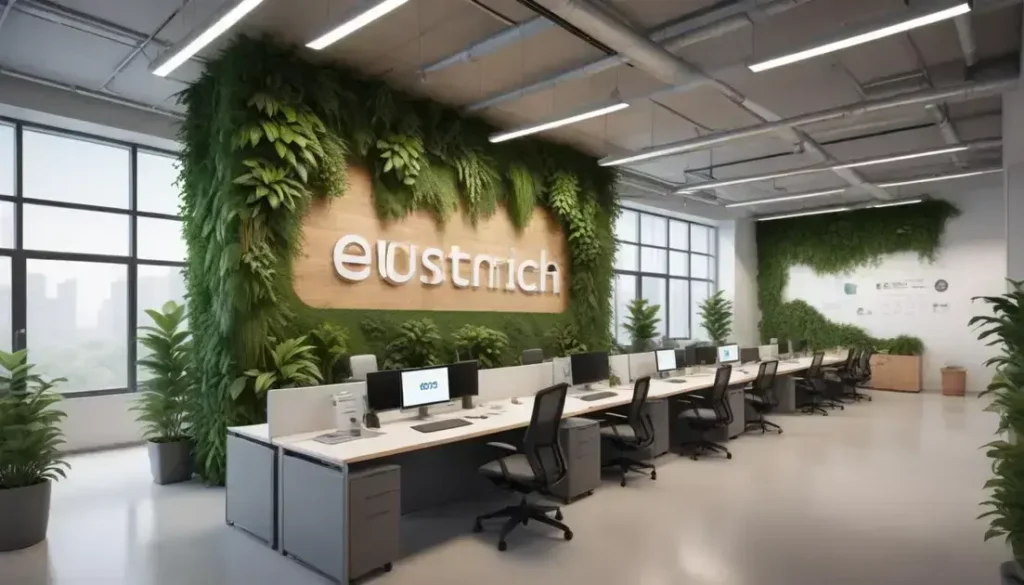The future of sustainability in business involves integrating green practices, utilizing renewable energy sources, and fostering innovation to meet consumer demand for eco-friendly products while enhancing operational efficiency and brand reputation.
The recent focus on sustainability is reshaping industries. Join me as we explore the latest initiatives and their implications for businesses.
Ogilvy’s AI Strategy and DEI Team Changes
Ogilvy has made significant strides in its AI strategy, recognising the need to integrate cutting-edge technologies into their operations. This approach aims to enhance creativity while improving efficiency across their global network. By leveraging data analytics and machine learning, Ogilvy can better understand consumer behaviour and tailor their marketing strategies accordingly.
Diversity, Equity, and Inclusion (DEI) are central to Ogilvy’s vision, ensuring that all voices are heard in the creative process. The recent changes in their DEI team reflect a commitment to fostering an inclusive culture. This initiative empowers diverse talent, which is essential for driving innovation and delivering relatable content to varied audiences.
Moreover, Ogilvy’s focus on combining AI insights with DEI principles enables the agency to challenge conventional advertising norms. By embracing diverse perspectives supported by AI-generated data, they aim to create campaigns that resonate on a deeper level with consumers. This synergy between technology and human insight is pivotal for remaining competitive in an evolving marketplace.
As Ogilvy continues to refine its approach, the emphasis on AI coupled with a strong DEI framework underscores a proactive strategy to navigate the challenges of today’s advertising landscape. This holistic view not only enhances brand relevance but also contributes to a more equitable industry overall.
World’s Largest Data Centre: Sustainability Concerns
The world’s largest data centre presents unique sustainability concerns that must be addressed in today’s environmentally conscious landscape. With massive energy consumption, these facilities are often scrutinised for their carbon footprint. As such, balancing operational efficiency with environmental responsibility is crucial.
Energy Efficiency: Many data centres are investing in energy-efficient technologies, including advanced cooling systems and virtualisation to reduce power usage. Implementing renewable energy sources, like solar and wind power, has also become a priority. This shift not only mitigates environmental impact but also enhances corporate responsibility.
Additionally, data centres generate considerable electronic waste. Thus, organisations must develop robust recycling and waste management programmes to ensure materials are reused responsibly. Prioritising circular economy principles helps alleviate the long-term environmental burden.
Water Usage is another critical factor. Data centres require considerable amounts of water for cooling, making it vital to employ sustainable water management practices. This includes using closed-loop systems to minimise wastage and adopting technologies that lower water consumption.
Ultimately, the sustainability of the world’s largest data centres hinges on innovative technologies and conscientious practices. By addressing these concerns, the industry can progress towards a greener future while maintaining the crucial functions they serve in our digital world.
Google’s Environmental Report Analysis
Google’s Environmental Report has garnered significant attention for its comprehensive analysis of the company’s sustainability initiatives. The report highlights Google’s commitment to achieving carbon neutrality across all operations, a goal they aim to meet through the use of renewable energy and innovative technologies.
Renewable Energy Investments play a pivotal role in this strategy. Google has consistently invested in solar and wind projects, striving to source 100% of its energy from renewable sources. This commitment not only reduces greenhouse gas emissions but also sets a benchmark for the tech industry.
Additionally, the report showcases Google’s efforts in supply chain sustainability. By collaborating with suppliers who share similar environmental goals, Google enhances its overall impact on reducing emissions across its global supply network. Their initiatives include reducing waste and encouraging sustainable practices among partners.
Moreover, the report details Google’s advancements in data centres, which are continuously optimised for energy efficiency. The integration of machine learning technologies helps in managing power consumption effectively, showcasing their dedication to innovation in sustainability.
In conclusion, Google’s Environmental Report provides a transparent look at their sustainability efforts, offering valuable insights for other firms aiming to improve their environmental footprint while fostering innovation in their operational models.
H&M’s Innovative Seaweed Collection
H&M’s Innovative Seaweed Collection showcases the brand’s commitment to sustainability and creativity in fashion. By utilising bio-based materials derived from seaweed, H&M is pioneering a new approach that addresses environmental concerns while offering stylish options for consumers. Seaweed, known for its rapid growth and abundance, serves as an ideal raw material for sustainable textile production.
This collection features a range of garments that combine fashion-forward designs with eco-friendly practices. By incorporating natural fibres sourced from seaweed, H&M not only reduces the reliance on synthetic materials but also demonstrates a shift towards a more circular economy. This approach aligns with the increasing consumer demand for sustainable fashion alternatives.
Environmental Benefits are significant. The use of seaweed contributes to lower carbon emissions during the manufacturing process, making it a more environmentally friendly option compared to conventional fabrics. Additionally, seaweed is biodegradable, further enhancing the sustainability of the collection.
H&M’s initiative also highlights the importance of innovation in the clothing industry. The Seaweed Collection reflects a growing trend among brands to explore alternative materials that have a lesser impact on the planet. This shift can inspire other companies to adopt similar sustainable practices, fostering a more responsible fashion industry.
UK’s Solar Roadmap Overview
The UK’s Solar Roadmap outlines a strategic vision for expanding solar energy across the nation. By focusing on increasing capacity and enhancing energy security, the roadmap aims to significantly boost the use of solar power in both residential and commercial sectors. The UK government recognizes the critical role of solar energy in achieving net-zero emissions by 2050.
Growing Capacity is a priority in this ambitious plan. The roadmap sets targets for solar installations, encouraging investments in both large-scale solar farms and smaller rooftop systems. By facilitating a favourable regulatory environment, the government aims to make solar energy more accessible and affordable for all households.
Furthermore, the roadmap emphasizes the importance of technological innovation. Advances in solar panel efficiency and energy storage solutions are crucial for maximizing the potential of solar energy. Research and development initiatives are being supported to enhance these technologies, ensuring the UK remains at the forefront of solar energy developments.
Additionally, the Solar Roadmap addresses integration with existing energy systems. Enhancing grid infrastructure and interoperability between renewable sources are vital to accommodate the anticipated increase in solar energy usage. The successful implementation of these strategies will position the UK as a leader in the global transition to sustainable energy.
Impact on British Manufacturers
The impact on British manufacturers is a critical aspect of the evolving landscape of sustainability and technological innovation. As businesses adapt to new environmental regulations and consumer demands for greener products, manufacturers face both challenges and opportunities. Embracing sustainable practices is now essential for staying competitive in the market.
Many British manufacturers are integrating renewable energy sources into their operations to reduce carbon footprints. This transition not only aligns with government policies but also responds to the increasing consumer preference for environmentally friendly products. By investing in green technologies, manufacturers can enhance their reputations while potentially lowering long-term operational costs.
Moreover, the shift towards sustainability encourages innovation in product design and materials. Manufacturers are increasingly experimenting with biodegradable materials and eco-friendly production processes. This innovation can lead to enhanced market differentiation, enabling companies to attract environmentally conscious consumers.
However, these changes are not without challenges. Many manufacturers face initial financial costs associated with transitioning to sustainable practices. Access to funding and expertise will be crucial in overcoming these barriers. Collaboration across industries and sectors can foster shared knowledge and resources, helping British manufacturers navigate this transformative phase more effectively.
Future of Sustainability in Business
The future of sustainability in business is rapidly evolving as companies recognise the importance of integrating environmental considerations into their core strategies. This shift is driven by an increasing awareness of climate change and consumer demand for sustainable practices. Businesses are now looking to adopt practices that not only benefit the planet but also enhance their bottom lines.
Adopting sustainable supply chains is a key strategy for many organisations. By sourcing materials responsibly and reducing waste, companies can significantly lower their environmental impact. Innovations in logistics and production processes, such as circular economy principles, enable businesses to minimize resource use while maximizing efficiency.
Moreover, the role of technology in driving sustainability cannot be overstated. Advances in green technologies, such as renewable energy systems and energy-efficient manufacturing processes, play a pivotal role in this transition. Companies are investing in research and development to create sustainable products that meet the needs of environmentally conscious consumers.
Additionally, corporate social responsibility (CSR) initiatives are becoming increasingly important. Businesses that prioritise sustainability in their operations are likely to enhance their brand reputation and loyalty among consumers. The future will see a stronger alignment between profitability and responsible environmental practices as sustainability becomes a core value of successful companies.
In Conclusion: Embracing a Sustainable Future
The journey towards sustainability in business is not only essential for the planet but also beneficial for companies. As we have seen, adopting sustainable practices can lead to enhanced efficiency, reduced costs, and improved brand loyalty.
By investing in renewable technologies and responsible sourcing, businesses position themselves as leaders in their industries. The integration of sustainability into core operations is increasingly viewed as a strategic advantage.
Moreover, consumers are actively seeking out brands that prioritise environmental responsibility, which further emphasises the need for companies to adapt. The future of business will hinge on these values, shaping a marketplace where sustainable practices are the norm.
Therefore, embracing sustainability is not merely an option; it is a necessity for long-term success and positive impact on our world.
Common Questions About Sustainability in Business
What are the benefits of adopting sustainable practices in business?
Adopting sustainable practices can lead to cost savings, improved efficiency, and enhanced brand reputation among environmentally conscious consumers.
How can businesses integrate renewable energy sources?
Businesses can integrate renewable energy by investing in solar or wind power systems, negotiating power purchase agreements, or joining renewable energy programmes.
What role does technology play in enhancing sustainability?
Technology helps enhance sustainability through innovations such as energy-efficient processes, waste reduction solutions, and tracking systems for sustainable supply chains.
Why is consumer preference for sustainability increasing?
Consumer preference for sustainability is increasing due to growing awareness of environmental issues and a desire to support brands that prioritise responsible practices.
How can small businesses start implementing sustainable practices?
Small businesses can start by assessing their current practices, identifying areas for improvement, and beginning with small changes like reducing waste or using eco-friendly materials.
What can businesses do to ensure long-term success in sustainability?
To ensure long-term success, businesses should set clear sustainability goals, regularly measure their progress, and adapt their strategies based on consumer feedback and industry trends.


